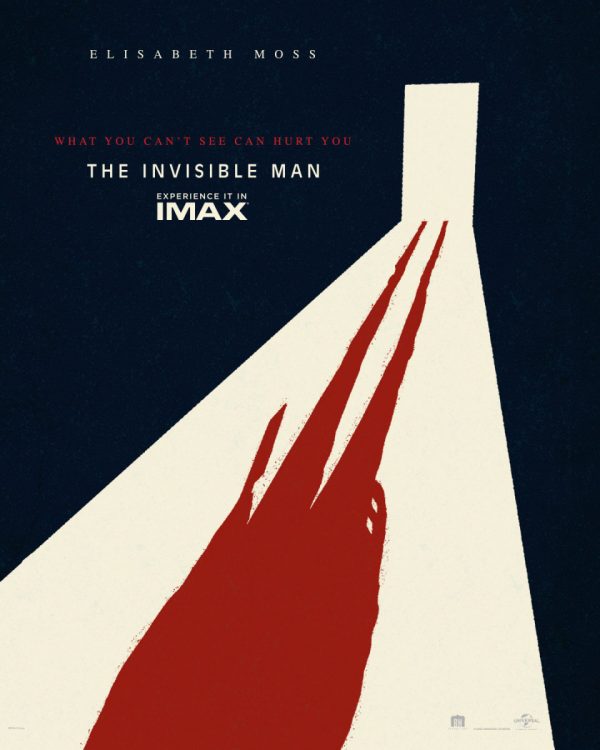The Invisible Man, 2020.
Written and Directed by Leigh Whannell.
Starring Elisabeth Moss, Storm Reid, Aldis Hodge, Harriet Dyer, Amali Golden, and Oliver Jackson-Cohen.
SYNOPSIS:
When Cecilia’s abusive ex takes his own life and leaves her his fortune, she suspects his death was a hoax. As a series of coincidences turn lethal, Cecilia works to prove that she is being hunted by someone nobody can see.
If for some reason you were doubting that this modern-day reworking of The Invisible Man would be any good, then allow me to tell you that you are a fool for lacking faith in Leigh Whannell, one of the more underappreciated horror writers working today (Insidious) and, as seen recently, a terrific sci-fi action director with style to boot (Upgrade). Adding the incredibly talented Elisabeth Moss to the mix tipped the scale from intriguing to must-see/probably going to rule hard.
It does rule hard.
However, the real reason this latest stab at Universal’s chance at a Dark Monsters cinematic universe works is because it’s not cheesy attempts like what has come before (god-awful generic Dracula movies and a new version of The Mummy that was so freaking silly not even Tom Cruise could save it). Leigh Whannell has taken the disappearing technology and updated the story simple but effectively (I can already hear the frustrations from many that the science isn’t really explained in favor of pursuing richer thematic material) about narcissists, human behavior, and our collective willingness to stand by and believe women or shun their conspiracy theories as crazy and worthy of being committed into a psych ward.
The film opens with Cecelia (Elisabeth Moss joining the ranks of superb acting turns in horror movies that likely won’t be considered for an Oscar nomination because the Academy hates the genre) enacting an elaborate scheme to escape her sociopathic mentally and physically abusive tech genius boyfriend, which includes running away from the entire isolated luxurious coastal home. Things go about as well as they can go, with Cecelia hopping into a car with her friend Alice (Harriet Dyer) and dropped off to live with mutual friends, police officer James (Aldis Hodge) and his bright teenage daughter Sydney (Storm Reid). Shortly after the great escape, word gets out that Adrian (Oliver Jackson-Cohen) has committed suicide, with his brother contacting Cecelia about the money going to her.
Not to state the obvious, but Adrian isn’t gone per se, but before he does return as an invisible stalker The Invisible Man does spend considerable time delving into the mental state of Cecelia, and if there’s anything Elisabeth Moss excels at (besides everything) it’s showing PTSD, the aftermath of trauma, and wild facial expressions showcasing true torment. She’s a regular person that got embroiled into a nasty relationship with an abusive billionaire that, now having regained some of her freedom, is finding the courage to get back outside and reintegrate herself back into society. One of the more brilliant touches Leigh Whannell puts on the script is that we are never entirely sure when Adrian is back, so when Whannell is playing with the camera and randomly cutting far back multiple rooms away allowing us to peek around corners or into small areas with Cecelia still in our peripheral vision, it’s genuinely unnerving and makes one wonder whether or not he has returned already or if it’s a filmmaker playing with us. To be fair, Leigh Whannell is so good at building tension and ominous dread that he is able to toy with viewers from the beginning.
An equally eerie score from Benjamin Wallfisch that utilizes piano compositions is also unsettling, but sound design as a whole is going to be the real unseen hero of The Invisible Man. Looking for footsteps from within various substances is not enough, as the film utilizes everything from creaks to crumpling bedsheets to pouring rain (an astounding sequence especially in Dolby Cinema where one begins to basically have a panic attack searching for anything offbeat regarding the sound to locate Adrian) to drive home the point that echolocation is the key to survival. For those that do prefer some visual panache, Adrian dismantles anyone in his way with hand-to-hand combat style resembling Upgrade with invisibility, showing that Leigh Whannell is skilled at organically employing all of his tools available.
The one unfortunate area where The Invisible Man falters comes from a combination of marketing and common sense. It takes a while for any physical contact between Cecelia and the eponymous stalker, but there’s nothing wrong with building suspense. The issue is that the trailer preceding many movies lately spoils nearly the entire plot and a number of key moments during the third act, so much so that it was difficult to truly enjoy the experience until I got past that and everything was fresh. For as creative as Leigh Whannell gets with subtle scares, the initial premise of “is she crazy or not crazy” gets a bit old knowing what’s coming. It’s also a pleasure to report that once things are new, The Invisible Man takes a surprising turn and concludes with a challenging question.
By now, it’s apparent that The Invisible Man spins the beloved tale into a #MeToo battle cry, but it doesn’t end so black-and-white. Cecelia was abused and entangled with a sociopathic narcissist, and Adrian did create technology as a means to torture her from beyond the relationship, but there are twists in store. Most importantly, they lead viewers on a path to test their willingness to believe women or if they are finally ready to check out and perceive parts of Cecelia as broken and insane. Rewatches may even be necessary to get to the bottom of it all. The one thing that’s for sure is that The Invisible Man isn’t here to shout those hashtags from the rooftop and proclaim itself as an ally, it’s daring you to look inside yourself and contemplate how much of an ally you really are. Sure, the first 110 minutes are chilling, spooky, and bloody fun with top-notch work from one of the best actors walking the earth today, but the ending is masterful work deserving of lengthy dialogues.
Flickering Myth Rating – Film: ★ ★ ★ ★ / Movie: ★ ★ ★ ★
Robert Kojder is a member of the Chicago Film Critics Association and the Flickering Myth Reviews Editor. Check here for new reviews, friend me on Facebook, follow my Twitter or Letterboxd, check out my personal non-Flickering Myth affiliated Patreon, or email me at MetalGearSolid719@gmail.com















